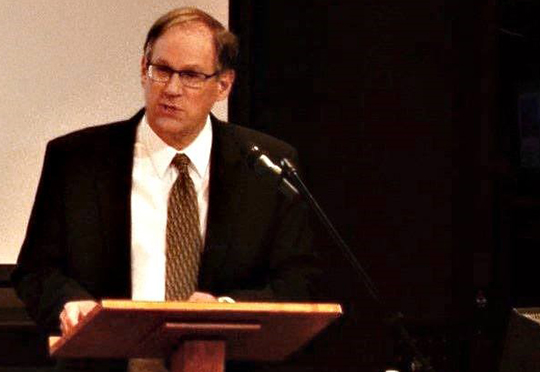 Elizabethtown College students and community members sat in silence in a crowded auditorium as Gettysburg Foundation President Matthew Moen used words, insight and a bit of humor to probe sensitive topics about political and social struggles in the United States.
Elizabethtown College students and community members sat in silence in a crowded auditorium as Gettysburg Foundation President Matthew Moen used words, insight and a bit of humor to probe sensitive topics about political and social struggles in the United States.
When Moen visited E-town College in mid-February to lecture on “Fixing Incivility in American Democracy: Lessons from Lincoln,” he started with a recap of the havoc at the Battle of Gettysburg in 1863. Then, he transitioned into the struggles facing Americans today, particularly the rift between opposing sides of the political spectrum.
“I have come to think of Gettysburg as something of a salve for this season of ill will that has arisen among us as Americans, a place for us to think about what truly matters in life,” Moen said, reflecting on how Gettysburg and its people healed after the battle.
Like every generation of Americans, you must earn this Democracy.”
Moen also discussed the current relevance of Abraham Lincoln’s Gettysburg Address due to its message about “resilience, forgiveness and redemption.” He suggested this is what today’s Americans need to stop incivility.
“Like every generation of Americans, you must earn this Democracy,” Moen said, highlighting the sacrifices made in the past for America’s freedom. He noted that U.S. Democracy has become more flawed over the years. Statistics show younger generations having less knowledge about politics than those in the past.
Moen discussed the discourse between people of varying points of view based on ignorance and distrust. “We’ve become convinced through our self-selected media echo chambers that our opinions are right and our motives are pure. So anyone who disagrees with us must be stupid or unpatriotic,” he said.
He also offered possible policy solutions he thinks might help American society, such as changing the oath of office to add a requirement of civility and respect, doing away with one-minute speeches from the House of Representatives or changing to non-partisan citizen commission. He also offered personal changes individuals can make, such as voting, reading more literature and responding actively to unjust situations.
While Moen said he does not know the answers to fixing American societal problems, he said he feels it’s time to experiment with new solutions because the current ones are failing.
David Kenley, director of the Center for Global Understanding and Peacemaking at E-town, said, with the current political climate, it made sense to bring Moen to the College. People are currently lashing out in uncivil ways because no one is listening, Kenley said. “I think political discourse is an important part of American society, but it’s especially important that we can engage in such conversations on college campuses,” he said. “This is the time in a young person’s life, and this is the environment where the free and open exchange of ideas is perhaps most crucial.”
First-year English and history major Ava Framm said she appreciated the relevance of Moen’s lecture and how he tied it into worldly issues. “I like seeing things from a global perspective,” she said, adding that E-town students and faculty members should have political and social discussions because, “It’s important to hear all the different sides and see where people are coming from.”
Near the end of the lecture, Moen assured the audience that despite the challenges the country is facing, he is “not at all hopeless.” He said he is optimistic and believes the American people can find ways to improve the current climate. Raising his voice, he added, “We are not helpless victims in some Dystopian storyline.”
Amanda Jobes Bio
Amanda Jobes is a junior English professional writing major and a Japanese minor at Elizabethtown College. She currently is the managing editor of the Etownian and tutors at Learning Services for two courses. During her spare time, she participates in the Community Chorus on campus.

